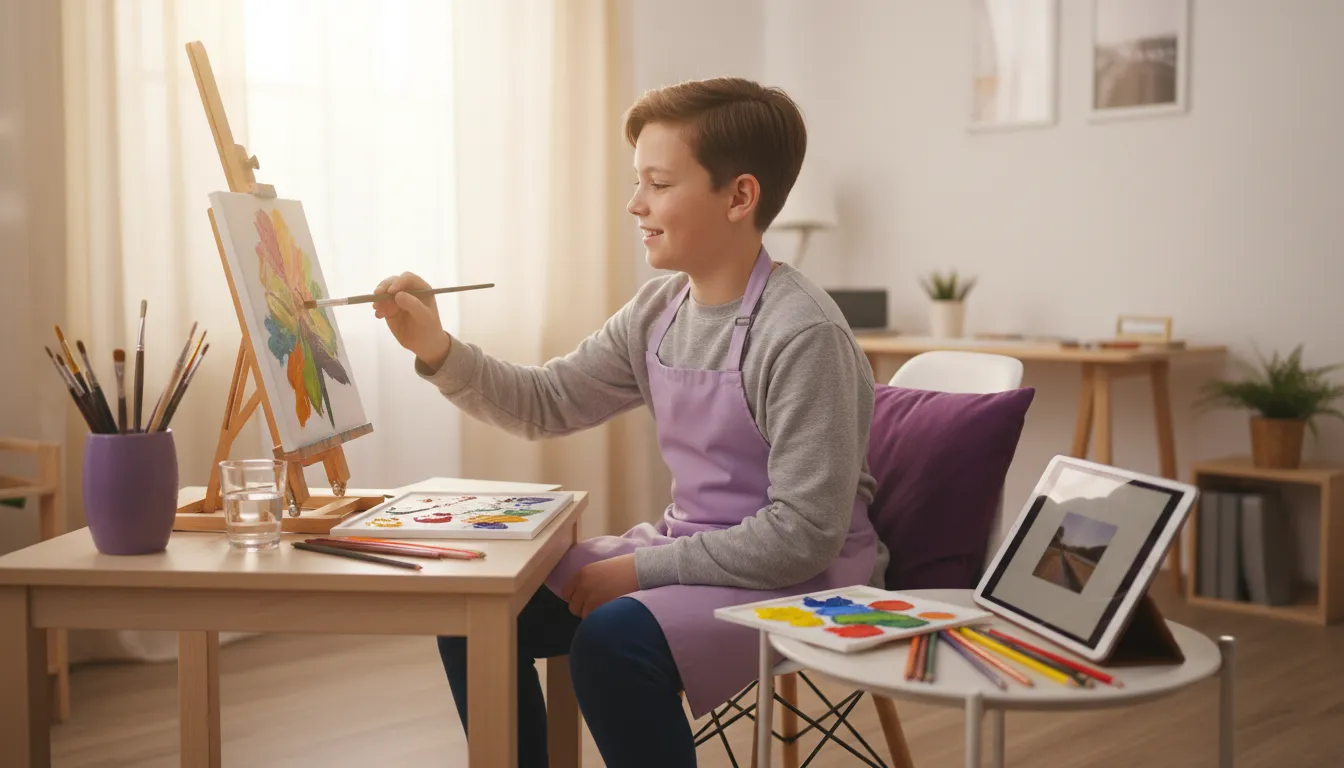Classical homeschooling is a time-tested method that builds on children’s natural stages of development. In the early years, the grammar stage, it emphasizes memorization, songs, and repetition to give students a strong foundation of facts and language. As they grow, this foundation supports the transition into logical reasoning and, later, the ability to express ideas with clarity and confidence. Unlike one-size-fits-all approaches, classical education aligns its methods with how children learn best at each stage, nurturing both skill and confidence that lasts a lifetime.
Whether you value rich literature, meaningful discussions, or the goal of raising thoughtful young people, classical homeschooling provides a flexible framework that fits your family’s unique needs. At Outschool, families can enrich their classical homeschool journey with live classes, small-group discussions, and self-paced options supporting every learning stage.
What is the classical homeschooling method?
The classical homeschooling method centers around an ancient educational framework called the trivium, which divides learning into three developmental stages: grammar, logic, and rhetoric. This proven framework recognizes that children and teens have different cognitive strengths at various ages and builds education around those natural patterns.
Modern classical homeschoolers have transformed this traditional framework by integrating contemporary resources and technology. This allows families to adapt classical methods to fit diverse learning styles and schedules. This flexibility enables online classes, hands-on experiments, and debate clubs, honoring timeless educational principles while embracing modern tools.
Choosing the best classical homeschool curriculum
When you're ready to choose the best classical homeschool curriculum, remember that the perfect fit depends on your family's unique needs, not what works for others. Start by reflecting on your goals, your child's learning preferences, and how much structure works with your family's daily routine.
- Assess your family's learning style and teaching comfort level: Consider whether you prefer comprehensive programs or enjoy mixing and matching resources to create a personalized learning plan.
- Identify your strengths and areas where you'd welcome support: If subjects like Latin, advanced sciences, or foreign languages feel challenging, plan for expert-led supplemental classes.
- Look for curricula that align with the trivium stages: Grammar stage programs should emphasize memorization and foundational knowledge, while logic and rhetoric stages need more discussion and writing practice.
- Enrichment plan that brings classical concepts to life: Live classes in literature discussion, creative writing, or critical thinking provide the peer interaction and expert guidance that enhance textbook learning.
- Budget for core materials and targeted supplemental resources: Many families successfully combine a solid base curriculum with specialized classes for challenging subjects, as classical education approaches recommend.
Choosing the best classical homeschool curriculum is a balance between structure and flexibility, independence and guidance, traditional and modern resources. By starting with your family’s goals, understanding your child’s learning style, and leaving room for adjustment, you’ll build a curriculum that grows with your child.
Adapting classical homeschooling for diverse learners and modern life
Classical homeschooling is rooted in tradition, but its greatest strength lies in flexibility. Families today can adapt this approach to meet the needs of neurodiverse learners, gifted children, and those with unique schedules, making it both timeless and practical.
- Support for diverse learning needs: Children with autism, ADHD, or other learning differences benefit from a structured yet flexible routine that reduces stress while providing clear expectations.
- Opportunities for individual pace: Classical homeschooling isn’t about keeping everyone on the same timeline. It allows children to progress according to their abilities, accelerating in areas of strength or slowing down when concepts need extra practice.
- Hands-on learning to enrich lessons: Field trips to museums, historical landmarks, or even local government events make history and civics come alive. Creative projects like science experiments, art inspired by historical eras, or cooking ancient recipes bring classical studies into daily life.
- Community connections for growth: Families can expand learning beyond the home with small-group live classes that foster discussion and peer engagement. This provides structure, expert teaching, and social interaction that enrich the classical framework.
- Flexible supplemental resources: Self-paced courses and 1:1 tutoring add targeted support in STEM, foreign languages, or creative writing. These resources complement the core curriculum, ensuring children receive broad knowledge and specialized skills.
By blending tradition with flexibility, classical homeschooling adapts beautifully to diverse learners and modern life. With space for individual pacing, hands-on enrichment, and access to supportive communities, families can create an education rooted in classical wisdom and responsive to the needs of today’s world.
FIRST MONTH FREE!
Get support that meets kids where they are.
Learn moreBenefits of a classical homeschool education in today’s world
The benefits of classical homeschool education extend far beyond the classroom, preparing learners for success in college, careers, and life. This time-tested approach builds skills that matter in our rapidly changing world, while adapting to different learning styles and family needs.
- Develops strong communication skills: Regular presentations, Socratic discussions, and persuasive writing exercises train students to express themselves clearly and confidently.
- Builds analytical thinking abilities: Students learn to evaluate information critically and solve problems creatively by engaging with classical texts and complex ideas.
- Cultivates self-directed learning habits: Classical education uses structured yet flexible methods supporting visual, auditory, and kinesthetic learners. This fosters independence, adaptability, and confidence in students with diverse learning needs.
- Provides an adaptable structure: The trivium naturally grows with each child’s developmental stage while maintaining academic rigor.
- Creates lifelong learners: Classical education instills a love of learning by sparking genuine curiosity and providing tools for deep inquiry.
Classical homeschool education offers enduring value in today’s fast-changing world. More than a method of schooling, it nurtures lifelong learners ready to thrive in both traditional academic paths and the innovative fields of the future.
Frequently asked questions (FAQs) about classical homeschooling
Starting a classical homeschool journey brings up plenty of practical questions, and that's completely normal. These frequently asked questions about classical homeschool methods address families' most common concerns when considering this time-tested approach to education.
At what age should I start classical homeschooling?
You can begin classical homeschooling at any age, even with older children who haven't experienced the foundational grammar stage. The beauty of this method lies in its adaptability; younger children naturally absorb facts and patterns, while older learners can jump into logic and rhetoric stages with proper support. Many families successfully transition to classical education regardless of their starting point.
How much time does classical homeschooling require each day?
Classical homeschooling typically requires 2-4 hours of focused instruction for elementary school students, gradually increasing to 4-6 hours for high school students. Supplementing with live online classes can help maximize learning time while giving parents flexibility in their daily schedules.
Can I use classical methods if my child struggles with memorization?
Classical education isn't just about rote memorization, despite common misunderstandings. While memory work plays a role, the method emphasizes developing critical thinking and analytical skills through literature, history, and discussion. You can adapt memorization activities to your child's learning style, using songs, games, or visual aids to make the process more engaging and accessible.
How can I support socialization and peer interaction while homeschooling classically?
Socialization opportunities abound through co-ops, community classes, and group activities where children can engage in discussions and collaborative learning. Classical education enhances social skills by teaching children to articulate their thoughts clearly and respectfully engage with different viewpoints.
Building your classical homeschool journey
Classical homeschooling begins with choosing resources that match your family’s pace and style. This approach, which builds knowledge and masters communication, becomes more accessible when passionate teachers and engaging peers share the journey.
With the right structured curriculum and modern support, families can build a unique path that cultivates wisdom, curiosity, and confidence. At Outschool, families can transform classical homeschooling from overwhelming to exciting with live classes and self-paced courses that fit seamlessly into any routine.






.svg)
.svg)







